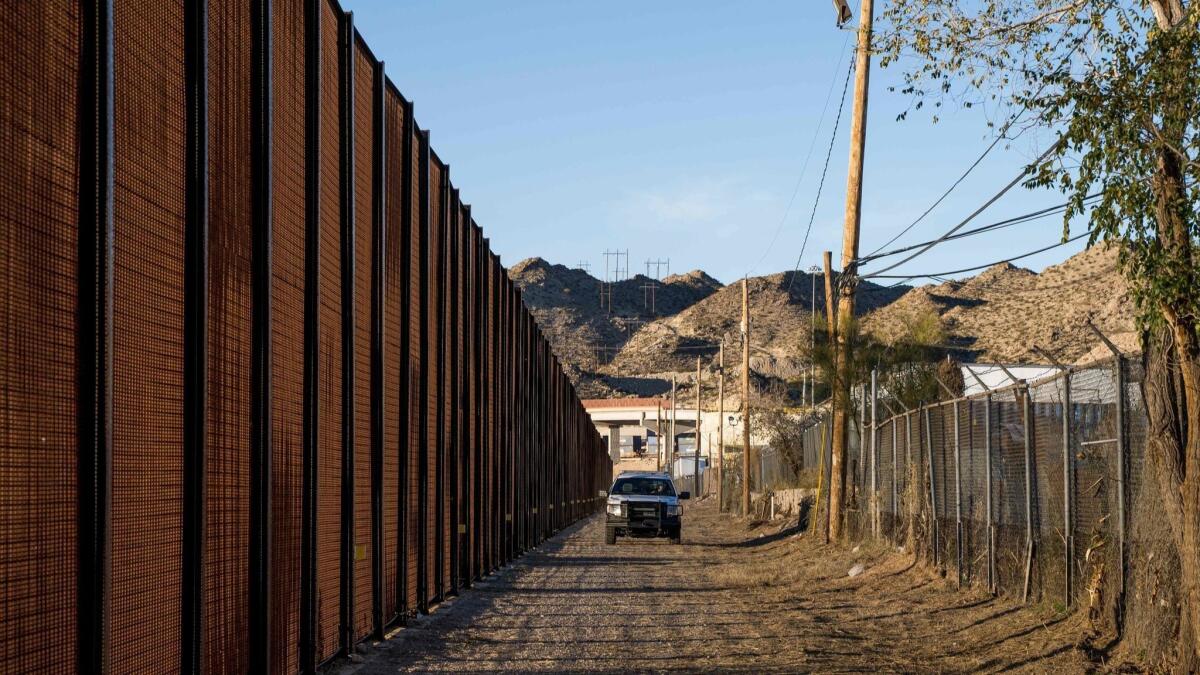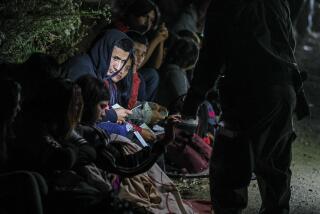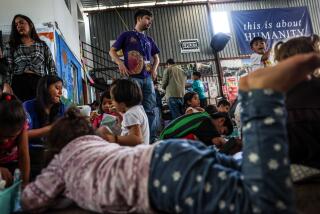Border Patrol to reassign staff, release migrants as illegal family crossings surge

Reporting from San Antonio — The Border Patrol plans to release large numbers of migrant families in multiple locations along the southern border in coming days, expanding a practice that began last week in south Texas.
“Something needs to be done,” a Border Patrol official said Wednesday, briefing a group of reporters here on condition that he not be identified. “We are at full capacity everywhere.”
Texas’ Rio Grande Valley and the El Paso area have seen the biggest influx of migrant families. So many have been taken into custody at the border that last week the Border Patrol took the rare step of releasing more than 2,000 migrants in the valley, officials said.
Some of the migrants said they and their children had been held for a week in miserable conditions before they were finally set free with notices to appear in immigration court.
Normally, the agency transfers migrants to Immigration and Customs Enforcement to be processed and placed in detention or released while they wait for court hearings. But as ICE facilities filled, the agency stopped accepting transfers from the Border Patrol.
Local shelters, which are already struggling to take care of large numbers of recently freed families, are preparing for even more.
Large releases are planned in El Paso, Yuma, Ariz., San Diego and possibly Del Rio, Texas, according to the Border Patrol official.
“We’re woefully underfunded for facilities,” he said. “It is a liability to have people in our custody for too long.”
Ruben Garcia, director of Annunciation House shelter in El Paso, said he was scheduled to meet with Border Patrol officials late Wednesday to discuss how many migrants will be released there. He’s not sure where the families will go. Area shelters were already nearly full Wednesday, when ICE released 750 more migrants.
“We had space for them — barely,” Garcia said.
The total number of migrants caught crossing the border illegally is still well below peaks of the early 2000s. But the surge of families, whose care presents more challenges compared with lone migrants, has overwhelmed U.S. facilities.
Of the 66,450 migrants caught last month, more than half were traveling with family. An additional 9,653 migrants arrived at border crossings with their relatives and claimed asylum.
The Border Patrol expects the total number of migrants taken into custody this month to reach 100,000, more than double the number last March. About 55,000 will have arrived in families, including 40,000 children.
After President Trump declared a national emergency on the border to pay for construction of his long-promised wall, Congress approved $415 million for improved medical care and detention for migrant families, including a new processing center with space for 800 migrants in El Paso. But that won’t open for months, and it won’t address crowding in other border cities.
As of Tuesday, the massive central processing center that holds thousands of migrants in the Rio Grande Valley was at 245% capacity, the Border Patrol official said. Overcrowding had reached similar levels in Yuma, El Paso and McAllen, Texas.
“Where it used to be just [the Rio Grande Valley], now it’s spreading,” the official said.
During a visit to El Paso on Wednesday, U.S. Customs and Border Protection Commissioner Kevin McAleenan warned that the agency had reached “a breaking point” and was “facing an unprecedented humanitarian and border security crisis all along our southwest border.”
“We are doing everything we can to simply avoid a tragedy,” he said. “But with these numbers, with the types of illnesses we’re seeing at the border, I fear that it’s just a matter of time.”
The Border Patrol was forced to increase migrant medical screenings in December, after two Guatemalan children died in its custody in the El Paso area. State medical examiners have yet to release the children’s autopsy reports.
Now, the Border Patrol hospitalizes about 60 migrants along the border each day, McAleenan said. During the last week, he said, infants have had 105-degree fevers, a 2-year-old suffered seizures in the desert, and a 40-year-old man suffering organ failure refused surgery.
The Border Patrol is temporarily reassigning 750 customs officers to assist Border Patrol agents processing, transporting and guarding migrant families, McAleenan said. That’s in addition to 85 agents already reassigned this year from the northern border to the southern border.
Removing hundreds of agents from the ports will probably cause traffic delays at border crossings during peak Easter holiday traffic, a popular time for cross-border family visits, he said.
The Border Patrol also took the unusual step of closing numerous highway checkpoints in its El Paso sector, which includes 268 miles of border in Texas and New Mexico.
The Border Patrol official said checkpoints could also be closed in other areas of the border, including the Rio Grande Valley, if the flow of migrant families does not slow.
More to Read
Sign up for Essential California
The most important California stories and recommendations in your inbox every morning.
You may occasionally receive promotional content from the Los Angeles Times.










